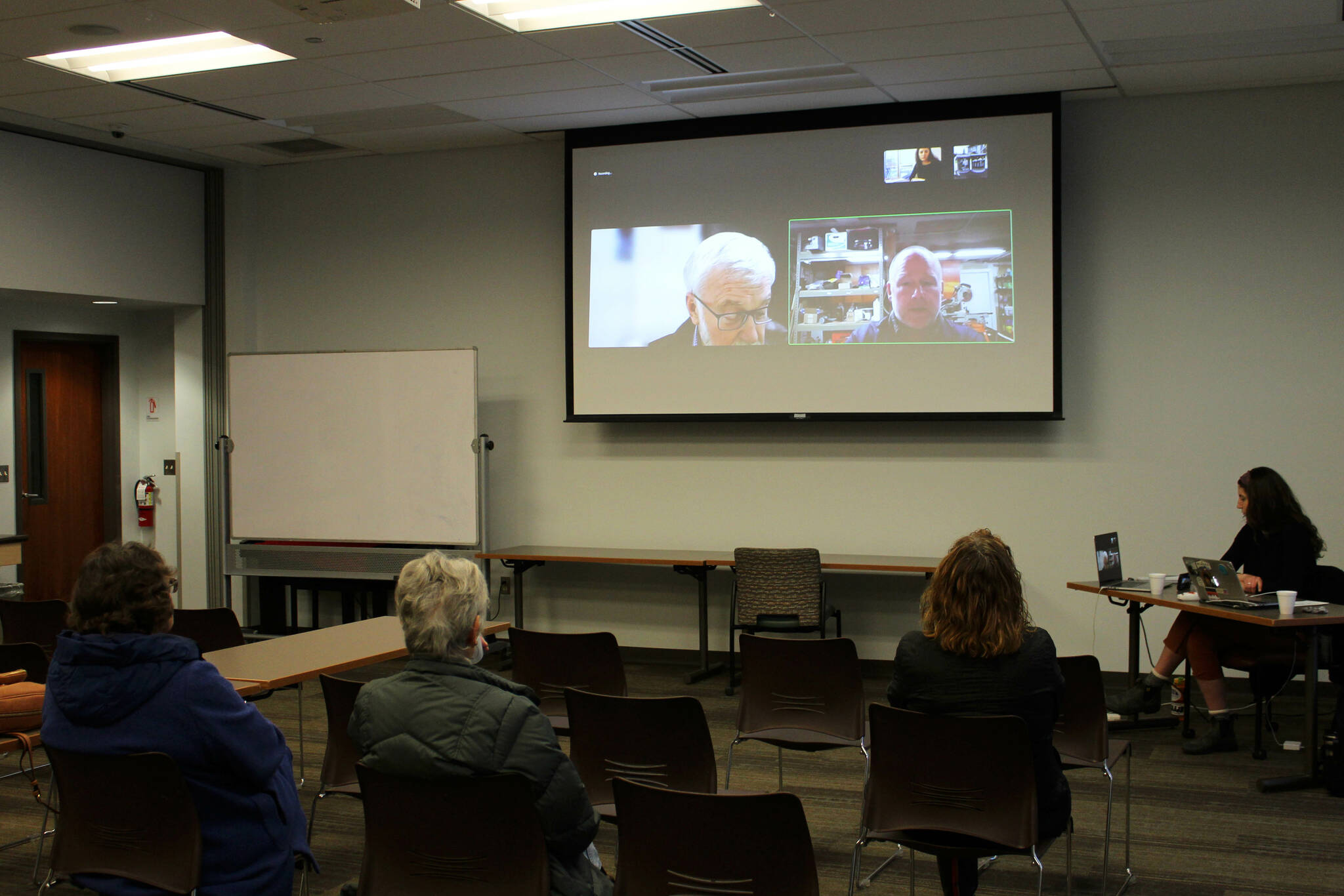Two of the three candidates running to represent the southern Peninsula, Kodiak and Cordova in the Alaska State Senate logged on to Zoom on Monday for a remote candidate forum held at the Soldotna Public Library.
Incumbent State Sen. Gary Stevens and challenger Heath Smith, both Republicans, participated in Monday’s forum and are running for State Senate District C, which includes the southern Kenai Peninsula and Kodiak. Republican Walter Jones is also running for the seat, but was unable to attend. Under Alaska’s ranked choice voting system, voters will have the option to rank the three candidates on Election Day.
The forum was the last in a series of nine held by KDLL 91.9 FM and The Peninsula Clarion, in partnership with the Soldotna Public Library and the Central Peninsula League of Women Voters. Over the course of roughly an hour, candidates fielded questions from moderators Sabine Poux, news director at KDLL, and Ashlyn O’Hara, government and education reporter at the Clarion.
The first five forums, held in the weeks leading up to the Oct. 4 municipal election, focused on local races. Forums were held with candidates for Kenai and Soldotna city councils, the Kenai Peninsula Borough School District Board of Education and the Kenai Peninsula Borough Assembly.
Stevens has served in the Alaska State Senate since 2003 and served in the Alaska House of Representatives from 2001 to 2003. He holds a doctorate from the University of Oregon and formerly served as president of the Kodiak school board and as mayor of both the City of Kodiak and the Kodiak Island Borough.
Smith served on the Homer City Council for six years and holds a bachelor’s degree in international relations from Brigham Young University. He is a graduate of Homer High School but has also lived in Anchorage and Fairbanks, and has worked for the United Parcel Service for 25 years.
Jones is a long-haul truck driver who has lived in Alaska for 32 years. He served in the U.S. Army for 18 years and is a member of the American Legion Post 18 in Ninilchik.
Candidates diverged on whether or not they support a constitutional convention, through which parts of Alaska’s founding document could be changed, though both Stevens and Smith said the question ultimately comes down to what voters decide.
Stevens said that he personally will vote no on the convention because he favors the amendment process as a way to make changes to the Constitution. Smith said a convention would provide Alaskans with the opportunity to make changes without having to wait for action by state lawmakers, who can amend the document and call a convention.
“I think that there would not be a prevailing wind pushing us towards a constitutional convention if the Legislature had been more responsive to the concerns of the people in addressing those things from the floor,” Smith said. “Clearly, there are several things that people are not happy with.”
When it comes to establishing a long-term fiscal plan for the State of Alaska, Smith said stronger leadership is needed to advance recommendations made by the state’s Fiscal Policy Working Group. Stevens said he’s worked previously as part of a fiscal working group but struggled to advance specific policies through the Legislature.
“In the Legislature, it’s not always what you want,” Stevens said. “It’s what you can get 11 other people in the Senate to agree to, or 21 of the people in the House to agree to. Every time we’ve come up, right at the point where we can have a strong fiscal working group or having strong fiscal policies, we’ve never been able to get the support of the rest of the Legislature.”
Both candidates said they oppose the implementation of statewide income or sales taxes as a way to boost state revenue, with Stevens voicing his support for Gov. Mike Dunleavy’s 50-50 plan. Under that plan, permanent fund earnings would be split between dividend payments and state services. Smith said he supports diversifying Alaska’s economy by developing more natural resources.
“While I understand that we need to fund government — and we deserve a fully functional and dependable government — the ultimate question is what size of government do we want and how much do we want to pay for that?” Smith said. “That’s a conversation we need to include the people in, not just the Legislature.”
Both candidates acknowledged that Alaska is struggling both to attract and retain education staff and that Alaska’s current compensation structure is flawed. Smith said the state needs a sustainable defined benefit plan that will keep staff invested in their job, while Stevens said a pension program may require reductions in medical benefits.
“I expect a bill this year that will be able to get to the end (and) that will find a way to have a good retirement for people, a good pension plan, but possibly not as gold-plated a medical plan as we now have,” Stevens said.
Candidates were also asked about energy security — both said they “absolutely” support the Alaska LNG Project — where they think they fit in the broader legislative landscape, and about times they’ve reached across the aisle to solve problems. The full candidate forum can be streamed on KDLL 91.9 FM’s website at kdll.org or on the Clarion’s Facebook page.
Election Day is Nov. 8 and early voting started Monday. On the central peninsula, early voting is available at Soldotna Prep School and the Kenai City Clerk’s Office. Both locations are open Monday through Friday from 9 a.m. to 4 p.m. More information about the election can be found on the Alaska Division of Elections website at elections.alaska.gov.
Reach reporter Ashlyn O’Hara at ashlyn.ohara@peninsulaclarion.com.


